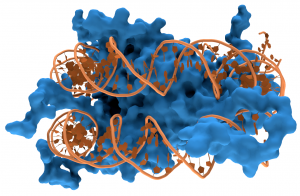THURSDAY, 9 FEBRUARY 2012
Cancer research has been booming in the last decade with an estimated global annual spend of over €14,000 million (£11,600 million). While more than 800 drugs are currently in development, a failure rate of 95%[1] means that new target molecules are always welcome.Cancer can be caused by over-expression of growth-promoting genes (oncogenes) or under-expression of growth-suppressors (tumour suppressors). Genes are not always readily available for transcription into messenger RNA molecules - their accessibility is tightly controlled by DNA packaging mechanisms.
Within the nucleus, DNA is tightly wrapped around molecules called histones. Histone tails largely carry positive charge due to amine groups on the lysine and arginine amino acids. These positive charges interact with the negatively charged phosphate groups on the sugar-phosphate backbone of DNA. Eight histone molecules form a core around which DNA is wrapped to form a nucleosome, and several nucleosomes are needed to package a single strand of DNA.
Adding acetyl groups, ‘acetylation’, neutralises positive charges, weakening the DNA-histone interactions. This allows parts of the DNA to unwind and become more accessible to transcription enzymes. Histone deacetylases are enzymes that remove these acetyl groups, returning the DNA to its tightly packed structure. They therefore silence or supress the expression of genes.
A team lead by Prof. John Schwabe[2] recently discovered a surprising link between histone deacetylases and the inositol phosphate signalling pathway. They showed that IP4 (inositol 1,3,4,5 – tetrakisphosphate) molecules regulate histone deacetylases, and hence the gene silencing mechanism.
Prof. Schwabe suggests that new drugs that manipulate this interaction, for example by regulating IP4 production within the body, or by inhibiting IP4 interactions with histone deacetylases, may have potential as novel anti-cancer agents.
Written by Architha Srinivasan

